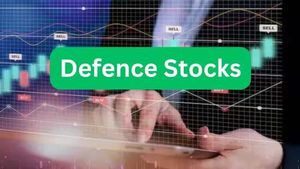Tax day is officially here in the United States, and this year, it seems that taxpayers are more anxious than ever. Despite the traditional spike in interest for tax advisors occurring in February, recent data indicates that searches for the term "tax advisor" reached an all-time high in April 2025. This surge in interest coincides with a notable increase in searches for how to file a tax extension, which jumped by 170% over the past week leading up to the deadline.
Starting from April 6, 2025, the trend shifted as more individuals began searching for "tax deadline" rather than "tax extension." This shift highlights a growing urgency among taxpayers to meet their obligations. As many grapple with the complexities of filing, questions about the process have surged. Some of the top trending inquiries this month include: how to file for a tax extension, what day taxes are due, how to pay taxes online, where to mail a 1040 tax return, and when tax season officially ends.
In addition to tax-related concerns, broader economic trends are influencing consumer behavior. Recent Google search trends and Amazon purchases suggest that many women, who typically prioritize self-care, are now seeking frugal tips and tricks to prepare for an uncertain economy. According to a recent analysis by the Wall Street Journal, the days of splurging on expensive concert tickets appear to be over.
For instance, searches for "press-on nails" have increased by 10% since February 2025, as individuals opt for more budget-friendly beauty solutions. Jordan Baird, a hairstylist at 6th & Big Beauty Bar Co. in Acworth, Georgia, has observed a shift among her clients towards what she refers to as "recession hair." Baird explains, "I find that recession hair during this time is, at first, it started out as more of a money — a budget thing. And then, I think, when people have seen how that organic look is just so beautiful … they’re loving it."
Moreover, the trend of do-it-yourself fashion is thriving, with social media platforms buzzing with frugal finds. Many consumers are turning to thrift stores or seeking cheaper alternatives to their favorite brand names like Nike and Lululemon. This shift reflects a broader trend where women are more inclined to cut back on personal luxuries for the sake of family needs. Anwesha Majumder, an economist at the National Partnership for Women and Families, notes, "Women are much more likely to say, ‘I will give up these luxuries, or these things that I enjoy, so that my kids can go to summer camp or so that we can do these things that we want for our family.'"
As consumers adjust their spending habits, other budget-friendly choices are emerging. Many are opting to cut streaming service subscriptions, choosing public transit over rideshares, or exploring automated therapy options instead of traditional in-person visits. These changes illustrate a significant shift in consumer priorities amid economic uncertainty.
Looking ahead, experts predict that the economy will experience slower and smaller growth in 2025. While President Donald Trump has paused some of his highest tariffs, the overall outlook remains cautious. The possibility of a recession looms, with opinions divided on whether it will occur. Some analysts argue that the current economic climate is too volatile to make definitive predictions, while others remain optimistic about a potential recovery.
As tax day approaches and consumers navigate a shifting economic landscape, the intertwining of personal finance and broader economic trends becomes increasingly evident. The urgency felt by taxpayers this year, coupled with changing consumer behaviors, paints a complex picture of the current financial climate in the United States.
In summary, as Americans scramble to meet tax deadlines and adapt to evolving economic conditions, the interplay between personal finance and larger economic trends is more pronounced than ever. Whether through increased searches for tax-related advice or a shift towards frugality in everyday spending, these developments underscore the challenges that many face in the current landscape.





